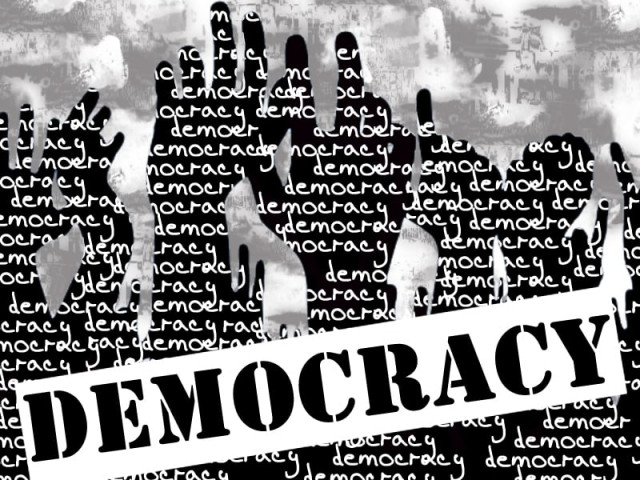The illusion of choice
As long as people remain divided, the elite walk away and continue to remain in the backdrop of politics.

Without citizen participation at the highest level, the essence of democracy is prone to decay as it will be unable to withstand the damaging winds of corporatism, oligarchism, absolutism. DESIGN: SUNARA NIZAMI
Diversity within human culture and ideology has and will always continue to exist. It is only when this diversity converges and accepts a social system that has values such as equality, justice and freedom as its underlying foundations can the state and its institutions function democratically.
Democracy does not mean pressing buttons every four years to decide between two different parties, nor does it mean leaving the decision-making process beyond its borders to a handful of representatives from these two parties or leaving the economic state of the nation in the hands of the banking nomenclature.
The foreign policy of a nation and the management of the economic system affect each and every person within, and thus, should be subject to a democratic process. Without citizen participation at the highest level, the essence of democracy is prone to decay as it will be unable to withstand the damaging winds of corporatism, oligarchism, absolutism or any other that entails monopolistic tendencies.

To illustrate how Washington functions as everything but a democratic state, and only appears under the guise of a “democracy”, two significant points need to be looked at.
First, and from a distance, the political culture on Capitol Hill seems to be filled with diversity, however, and as soon as we shed light on how Republicans and Democrats have managed what I call “impact policies” over the last decades, it becomes immediately crystal clear that this diversity rests solely on the surface.
Impact policies include the foreign policy and macro-economic policy of a nation.

Although the antagonism between Republicans and Democrats appears to be relatively strong, as the ballot boxes reveal every four years, as soon as one or the other party comes to power, the impact policies remain untouched – change can be only seen within the rhetorical package. When viewed in retrospect and if plotted on a graph, these policies can be dotted precisely in a linear fashion and future policy trends can be easily predicted.
To put it into context, examples such as military spending, geopolitical strategy employed in the Middle East or Asia Pacific or the stance towards the Israeli and Palestinian issue or the cyclical war pattern that the nation initiates every decade on taxpayers’ shoulders and the death tolls that come with it, only reinforce this stubborn trend.

This culture prevailed and was actually strengthened when President Obama decided to bring in those Democrats that were vociferously supporting the wars in Iraq and Afghanistan. The handful of Democrats that were against military occupation, drone warfare and enhanced torture techniques were, once again, muted and left without a job. Even Guantanamo Bay recently received $200 million in taxpayers’ money to upgrade the facility (and perhaps to make even further room for more inmates to be held without a charge and a fair trial). The taskforce formed to close down Guantanamo Bay has been decommissioned.
John O Brennan, who notoriously led the drone and torture programme, has been promoted to the CIA director.
Equally important, ‘change’ was even highly anticipated in the financial and economic spectrum when President Obama took office. Instead of following the tune of his political campaign and making the necessary sweeping changes, Obama reappointed the same players in his first term that served in the Bush administration to handle the management of the economy. These were the same class of people that were responsible for deregulating the financial system and letting Wall Street run wild. Some notable names include Tim Geithner, Ben Bernanke and Lawrence Summers.
Recently, Obama selected Mary Jo White to regulate the financial sector. She previously worked for Wall Street’s favourite legal firm (and her husband is currently a partner there) called Debevoise & Plimpton. In addition, Lew was brought as the Treasury Secretary. He earned a handsome $944,518 while working for Citigroup in 2008, another institution bailed out by taxpayers.
Even the Justice Department is contaminated with the same ideology, led by Eric Holder, who worked for Covington & Burling LLP, a legal advisory firm that serves corporations such as Blackwater XE, Phillip & Morris, Halliburton and Wall Street firms.
It seems to me that to get promoted these days, all you have to do is to be on the opposite side of the values that build the foundations of a democracy.
Secondly, the antagonism between Republicans and Democrats has reached unprecedented levels ever since the financial crisis engulfed the United States, providing no hopes of reaching an agreement in both the short and long run, even when it comes down to the pettiest of issues. This growing antagonism between the political parties only adds fuel to the destabilisation process within America, separating people further and further into various segments.
Rhetoric is heating up in Congress on issues ranging from the budget to Islam (mosques construction), immigration, homosexual, abortion to gun control. They continue to dominate the headlines in the mainstream press.
Altogether, these domestic issues in my opinion provide a smokescreen or “finger-pointing” distraction at a time when the fragile economic system, the corruption in the White House, the failure to uphold the rule of law and the never ending wars on foreign soil should actually be the primary discussion, as they eat away the pie at home and only add fuel to racial, class and gender inequality.
As long as the people remain divided, the elite walk away and continue to remain in the political backdrop – opaque and unseen. Washington has become an institution facilitating this process, as citizen participation in impact issues is on an all-time low and corruption (conflicts of interests) on an all-time high.
Divide and rule is no longer a key ingredient in foreign policy matters, it has now arrived at home, and with a vengeance.
The writer is a freelance journalist
Published in The Express Tribune, April 15th, 2013.
Correction: Earlier version of the story incorrectly mentioned Chuck Hagel's name. It has been fixed.
Like Business on Facebook to stay informed and join in the conversation.



















COMMENTS
Comments are moderated and generally will be posted if they are on-topic and not abusive.
For more information, please see our Comments FAQ